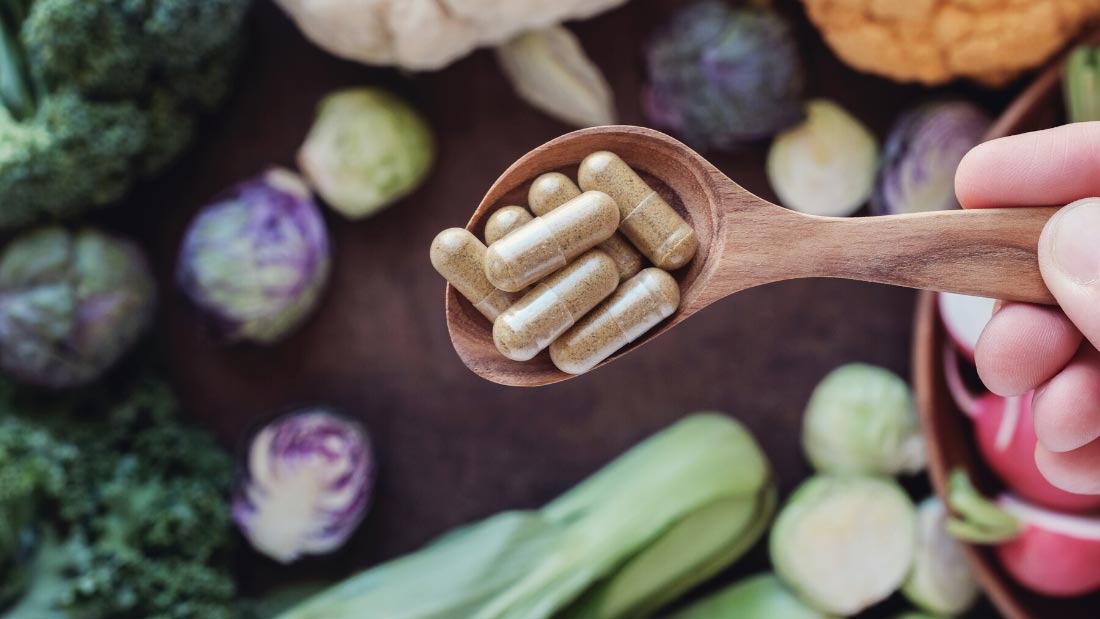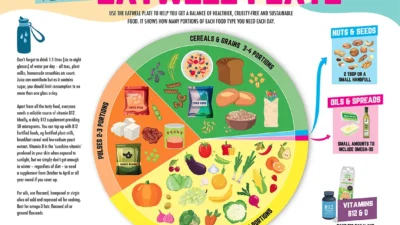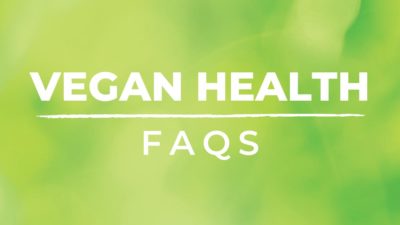Do vegans need supplements?

According to some ‘health experts’ vegans can barely get through the day without needing handfuls of supplements. Complete nonsense, of course; the only exceptions being vitamins B12 and D – which everyone needs. A healthy vegan diet, including a reliable source of B12, can provide all you need, as well as lowering the risk of many diseases. You don’t need lots of expensive supplements or powders but if you’d like some reassurance, here are the basics to ensure you have everything covered.
All major health bodies agree; a well-panned vegan diet can provide all you need while lowering the risk of all the big killers – obesity, diabetes, heart disease and cancer. However, we do need to pay attention to a few key nutrients to ensure we are getting the best out of our diet.
Vitamins B12 and D are the only vitamins not made by plants. B12 is produced by microbes and vitamin D is made by animals, including ourselves, when exposed to sunshine! Everyone, whatever your diet, needs a reliable intake of both B12 and D as you can’t rely on your diet, even if it includes fortified foods.
Vitamin B12
We need B12 to maintain healthy nerve cells, produce DNA – the body’s genetic material – and it works closely with folic acid to make red blood cells. It also helps iron to work better in the body and is essential for a healthy immune system as well as helping to regulate mood. It really is an important vitamin!
Low B12 levels in the UK are not uncommon, especially in older people. One study suggests that in the UK, six per cent of people under 60 and 20 per cent of those over 60 are deficient in B12. They also say 11 per cent of UK vegans are deficient, which is why Viva! says it is important for vegans to take a B12 supplement. The Government’s 2016 National Diet and Nutrition Survey found low levels indicating deficiency in three per cent of girls 11 to 18 years, six per cent of adults 19 to 64 years, five per cent of men over 65 and eight per cent of women over 65. Interestingly animal foods, specifically pork-based products, have significantly lower vitamin B12 (and iodine), around one-third less, compared with the early 1990s. This may be because pigs are no longer fed animal offal!
Vitamin B12 is produced by bacteria in soil and in the past, both people and animals got it from eating unwashed food. Food production is now so sanitised that B12 has been stripped out, which is why we now need a supplement to replace it. Ironically, farmed animals are now also given B12 supplements for the same reason, so meat and dairy are not the ‘natural’ source of B12 that the industry likes to claim. It’s healthier to cut out the middleman – meat and dairy – and take your own supplement!
In recent years, we’ve realised just how important B12 is – not just to vegans but to everyone, especially the over-50s as the ability to absorb it declines with age. Deficiency can cause serious problems and symptoms include extreme tiredness, pins and needles, muscle weakness, depression and cognitive problems. It can even increase the risk of heart disease and stroke. Levels of B12 can be easily checked and deficiency can be treated with supplements or injections. To avoid this, Viva! recommends you take 50 micrograms of B12 a day, or 2,000 micrograms a week but avoid taking more than this.
Vitamin D
We need vitamin D for healthy bones, teeth, muscles and other essential functions. Known as the sunshine vitamin, it’s made through the action of sunlight on skin. UK levels of vitamin D deficiency are high, particularly among people with darker skin and for everyone during the winter months. In spring and summer, most people in the UK can make enough through daily exposure to sunlight for five to 25 minutes – this short timespan minimises the risks of sunburn and skin cancer. The lighter your skin, the less exposure you require and ‘little and often’ is the best approach for most people.
From October to early March, sunlight in the UK doesn’t contain enough UVB radiation for our skin to make vitamin D so a supplement is required and the Government recommends 10 micrograms a day. People who are housebound, cover up their bodies or always wear sunblock should consider taking a supplement all year round.
There are two types of vitamin D – D2 is always vegan whereas D3 is usually of animal origin but can be obtained from algae or mushrooms. If a food label just says ‘vitamin D’ it’s usually D3 of animal origin. However, food producers are increasingly trying to use D2 to make their products more vegan-friendly, for example Ready Brek contains D2. You can get vegan supplements containing D2 or D3 derived from algae or mushrooms. Too much vitamin D can cause your body to absorb more calcium than it needs, which can be harmful – so no more than 100 micrograms a day, according to the Government.
Calcium
A healthy vegan diet, rich in wholegrain foods, pulses, nuts and seeds, will cover your needs for this mineral. The best sources include tofu (made with calcium sulphate), fortified vegan breakfast cereal, plant-based milks fortified with calcium, dried figs, kale, sesame seeds and tahini, tempeh, wholemeal bread, baked beans, butternut squash, nuts (particularly almonds and Brazil nuts), spring greens and watercress. While spinach, chard and beet greens do contain calcium, they also contain a substance called oxalate, which blocks calcium absorption. Calcium is more available from low-oxalate green vegetables such as kale, broccoli and bok choy. The calcium they contain is absorbed about twice as well as the calcium in cow’s milk, plus they contain fibre, folate, iron and antioxidants, which you won’t find in a pint of milk!
Iodine
We need iodine for healthy thyroid function and to help regulate how energy is produced and used in our bodies. The dairy industry likes to warn how vegans miss out on iodine by shunning cow’s milk. The truth is that iodine is not naturally found in dairy milk but comes from supplements fed to cattle and iodine-containing disinfectants that are used to clean teats and udders.
The amount of iodine in plants depends on the amount in the soil where they were grown. By occasionally including some seaweed, such as arame, wakame and nori, in your diet, or using iodised salt (sparingly) you should obtain sufficient iodine. An increasing number of companies also add iodine to their plant-based milks – check the packaging. Adults need 140 micrograms a day, this can be achieved by eating a varied vegan diet with some seaweed now and then. Too much iodine can disrupt thyroid function, leading to weight gain but up to 500 micrograms a day is unlikely to cause harm.
Omega-3s
Our bodies can’t produce essential omega-3 fats so we need some in our diet. They are a part of our cell membranes and affect cell functions throughout the entire body. They help us produce hormones and control inflammation and may lower the risk of heart disease. One or two teaspoons of flaxseed oil daily, or a handful of walnuts and a tablespoon of ground flaxseeds, can provide all you need but if you want to take a vegan supplement, look for EPA/DHA on the label and choose one produced from algae – the same place that fish get their omega-3s from.
Selenium and Zinc
You don’t need a supplement for either of these minerals. Selenium is found in sunflower and sesame seeds, wholegrains, tofu, asparagus and mushrooms but Brazil nuts are by far the richest plant source and just two a day could help you meet your needs. The best plant sources of zinc include tempeh (fermented soya beans), wholewheat spaghetti, tofu, quinoa, pumpkin seeds, lentils, couscous, wholegrain rice, cashew nuts, sesame seeds and tahini.
With a little planning, a healthy varied vegan diet can provide all the essential nutrients you need, with a regular top up of vitamins B12 and D.
For more information see more information see out A to Z of Nutrients.







